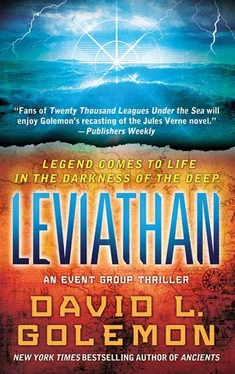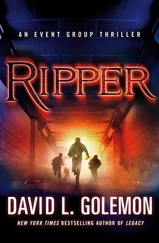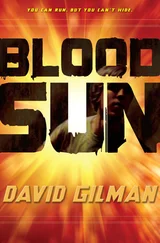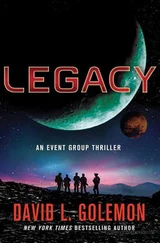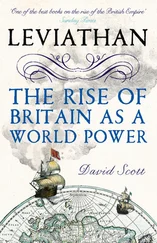The first officer raised his eyebrows and looked at Lofgren.
"I guess it would have had to have been big to shove aside that much water. Are you sure the object was that deep?"
Again, the young man was hesitant to answer. "Captain, it was so deep that…" He saw the impatience showing on both officers' faces. "About fifteen hundred feet at first contact."
"Fifteen hundred feet of depth and then it suddenly sprang like a cheetah up to seventy-five knots? I can't buy that, Cleary. Not even the Russians have anything remotely close to half that," the first officer said.
"Write it up, Cleary, and get it to me. We'll bait the hook and send it out and see if anyone at COMSUBLANT bites."
As Captain Lofgren returned to the conn, he half-turned to his first officer.
"Before you say anything, Dick, we know the attack on the surface happened, and we know Columbia didn't do it. Therefore, someone else had to have done it. In addition, that someone did it in clear listening range of not only us, but also that Chinese sub they handled with ease. I'll bet my command that the attacker and Cleary's strange contact are one and the same."
The captain turned and saw the eyes of his crew looking at him. The unknowns being pondered frightened them, and he could see it.
Every man aboard knew they had something in the water that could outrun and outgun them, and nothing made an American submariner more concerned than an unseen and unknown enemy.
EVENT GROUP COMPLEX,
NELLIS AIR FORCE BASE, NEVADA
Director Niles Compton sat with the sixteen departmental heads of the Event Group, silently watching a briefing delivered to the President of the United States by his national security team from the White House. The council there did not know the Event Group was listening in.
"With our losses in the sea of Japan five weeks ago, our weakened status dictates that we have to redeploy our forces even more thinly than they are," the Chairman of the Joint Chiefs, General Kenneth Caulfield, said as he stood before the large situation board.
"Ken, we'll get back to that. What I want to know is what we have on the attacks in Venezuela."
Caulfield nodded toward Admiral Fuqua, the naval chief of staff, who opened a file folder and cleared his throat as if he were uncomfortable with what he was about to say.
"The detonations at sea against the oil tanker, the Greenpeace vessel, and the Chinese attack submarine were nuclear in nature. The yield of each weapon estimated at only five-point-six kilotons. As with the warheads detonated over Caracas, the radiation yield was almost nonexistent. These were the cleanest weapons we have ever come across. Dissipation occurred only hours after the attacks, and there are no lingering effects to air, ground, or sea."
"That's impossible," ventured the president's national security advisor. "No one has weapons that clean, we would have—"
"Andy, what have the boys across the river come up with on where this nuclear material originated?" the president asked CIA Director Andrew Cummings.
"Well, sir, the samples sent to us by courier from our naval asset in the area support no conclusions as to where this material was bred; they only raise more questions."
"Come on, Andy, I'm not going to hold you to it. Give me what your people are thinking."
"We have nothing on record as far as a nuclear fingerprint goes. This material may have been spawned by a breeder reactor that has not been identified."
"Again, that's impossible; the Nuclear Regulatory Commission has—"
"Damn it." The president slammed his palm down on the tabletop, cutting his security advisor short once more. "I think everyone in this room better have learned by now that there are people out there we know nothing about. The Atlantis incident should have taught you that. Assume we have someone out there that can toss clean nukes around. Let's concentrate on finding out who and why, not the impossibility of it," the president said angrily.
In Nevada, Niles Compton glanced at several of his key people, including Captain Carl Everett of the security department and Virginia Pollock, the assistant director of the Event Group. They both saw Niles nod toward them, indicating they would be assigned the task of efforting the problem of clean nukes on their end, at least historically speaking, to see if any research conducted in the past historical record could be uncovered. Without being ordered to do so, Niles hoped to help his old friend in the White House with something the Event Group might have in their database. The Event Group had vast archives on the discovery, engineering, and manufacture of fissionable materials for their study.
"We may have a break as to the why part of the equation, Mr. President," Cummings said in Washington as he opened another red-bordered file folder.
"Go ahead, Andy, something is better than nothing. I'm tired of finding things out at the last minute and playing catch-up; we've been bloodied the past six weeks by groups who have slipped by our intelligence services." He saw that his comment stung almost every man and woman in the room. Even his best friend in Nevada, Niles Compton, felt the rebuke.
"Sir, we do know that the supertanker that was hit was banned from every oil pumping station in the world, with the exception of Caracas, for environmental reasons. Venezuela had leased her, and China was the only nation that agreed to allow her to dock at their off-loading facilities in Shanghai."
"Okay, we have a starting point. Andy, get with the EPA and get me some exact numbers on the leakage. Knowing Chavez, he's going to start throwing around accusations, and we've been his popular target lately. I do not want another leader of a third world nation saying we did something we did not do. Steve, I want you to head up the relief for Caracas. Get as much food, medical, and other essential material down there as we can spare. Those people need help regardless of who their leader is."
Steve Haskins of Emergency Management nodded and made notes.
"Ken, Admiral Fuqua: best guess, who could have done this?"
"Ladies and gentlemen, with the exception of the Directors of CIA, FBI, NSA, the Secretary of Defense, and the National Security Advisor and the Joint Chiefs, would you please excuse us. Mr. President, I don't know who's on the other end of that camera, but I advise shutting it down," General Caulfield said, suspecting that the answer lay in the strange little man who had assisted in the Atlantis operation a few weeks before, part of the president's private think tank.
"I'll leave it on for now, Ken. With the exception of those named, please excuse us."
The rest of the cabinet and council filed quickly from the room.
When the room cleared, Caulfield nodded toward Admiral Fuqua, who stood and pulled down a viewing screen as the lights dimmed.
"Mr. President, we have information we received from the attack boat USS Columbia , one of our newest Los Angeles class subs. She is the asset I spoke of earlier. She may have picked up a glimmer of something else, maybe the attacking force, we're not sure. As you see, this is a tape of her sonar."
On the screen was the waterfall display from the BQQ passive sonar display on Columbia . It was a series of lines running downward on the screen, and these lines represented the water around the sub. As they watched, there was nothing out of the ordinary on the display screen. Then a shadow of darkness presented itself for a split second and vanished.
"This object was thought at first to be a glitch in the sonar, but we have learned the object was solid, and we caught it only because of the burst of speed it displayed when it started diving away from the attack area. It's three and a half miles off Columbia 's bow. The estimate of its size is close to a thousand feet in length, and it went from a static, or zero buoyancy, position to over seventy knots."
Читать дальше
